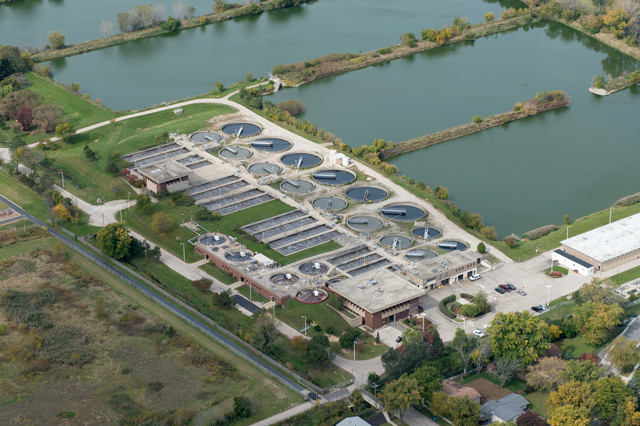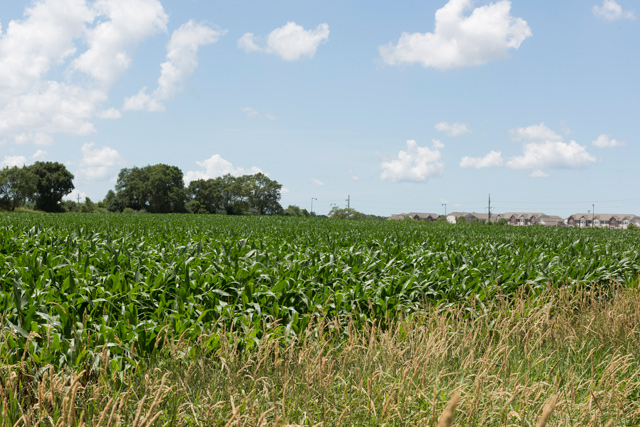Hanover Park WRP

In service since 1963, the Hanover Park Water Reclamation Plant (WRP) was the nation's first major tertiary wastewater treatment facility. It cleans an average of 12 million gallons of water per day (mgd) with a design capacity of 22 mgd and removes 98 percent of the contaminants. The plant’s outstanding performance has been recognized for several achievements, including as the "Best Operated Plant of the Year" in the state of Illinois, presented by the Illinois Association of Water Pollution Control Operators and the Illinois Environmental Protection Agency.
Water entering Hanover Park WRP
passes through coarse screens to filter out large debris, followed by
pumping and primary settling, which includes further screening, grit
removal and separation of solids from the water in which aerated grit
tanks and settling tanks remove fats and oils. In secondary treatment,
microorganisms remove organic material from the water as oxygen is pumped
into aeration tanks. Solids then settle at the bottom and clean water
flows out the top of additional settling tanks.
After passing
through primary and secondary treatment, the treated water at Hanover Park
passes through sand filters and is then disinfected using chlorination and
de-chlorination. Clean water that has passed through the Hanover Park WRP
treatment processes is released from the Hanover Park WRP into the DuPage
River. It only takes 12 hours for wastewater to be converted from raw
sewage to clean water. The same transformation would require several weeks
in a natural waterway.
The Hanover Park WRP serves more than 56,000 residents within an 11.2 mile area covering northwestern Cook County communities, including Hanover Park, Bartlett, Schaumburg and Hoffman Estates. In 1969, the Metropolitan Water Reclamation District of Greater Chicago purchased the Fischer Farm (200 acres adjacent to the Hanover Park WRP) and built the Upper DuPage reservoir which holds approximately 75 million gallons of stormwater overflow.
The farmland also includes
100 usable acres for growing corn, oats and soybeans. Solids produced at
the Hanover Park WRP are recycled as soil conditioner for the farm fields.
The harvested corn and soybeans are used for feedstock, ethanol and
biodiesel. The MWRD is planning to develop part of the site at Fischer
Farm for additional native plant production and implementing a Native
Prairie Landscape by utilizing existing growing media currently produced
as a composted byproduct of the water treatment process from the MWRD’s
Lawndale Avenue Solids Management Area in Willow Springs. Plans also call
for eight-acres to be developed into a tree nursery, new facilities such
as a greenhouse, an outdoor gathering space, educational opportunities,
trails through restored areas and streambank restoration among other
elements. Approximately 2,200 native trees, shrubs and plants grown at the
new tree nursery are sought to replenish the canopy that over the last few
years was lost due to the emerald ash borer and other pests.
The
resulting biosolids that are recovered from the water treatment process
are a sustainable alternative to chemical fertilizers containing essential
plant nutrients that stimulate plant growth and improve soil tilth. The
Hanover WRP produces 1,000 dry tons of biosolids each year. In 2014, the
MWRD began a biosolids composting program where processed biosolids are
mixed with wood chips to produce a high quality compost product. New
legislation signed by Gov. Bruce Rauner in 2015 amended the Environmental
Protection Act to recognize the exceptional quality biosolids that the
MWRD produces as a resource and not a waste, making this recovered
resource more accessible to the public. The law helps cement the MWRD’s
biosolids program, which has received acclaim from farmers, golf course
managers, landscapers, municipalities, park districts and homeowners who
use them. It also gives additional traction to the MWRD’s Hanover Park WRP
Fischer Farm site, as a potentially excellent home to a future tree
nursery.
To learn more about Hanover Park WRP, visit here.

Fischer Farm site at Hanover Park Water Reclamation Plant
| National Association of Clean Water Agencies | |
2018 |
Platinum Award for 100% Compliance with National Pollutant Discharge Elimination System Effluent Standards. |
2017 |
Platinum Award for 100% Compliance with National Pollutant Discharge Elimination System Effluent Standards. |
2016 |
Platinum Award for 100% Compliance with National Pollutant Discharge Elimination System Effluent Standards. |
|
2015 |
Platinum Award for 100% Compliance with National Pollutant Discharge Elimination System Effluent Standards. |
|
2014 |
Platinum Award for 100% Compliance with National Pollutant Discharge Elimination System Effluent Standards. |
|
2013 |
Platinum Award for 100% Compliance with National Pollutant Discharge Elimination System Effluent Standards. |
|
2012 |
Platinum Award for 100% Compliance for more than 5 years with National Pollutant Discharge Elimination System Effluent Standards. |
|
2011 |
Gold Award for 100% Compliance with National Pollutant Discharge Elimination System Effluent Standards. |
|
2010 |
Gold Award for 100% Compliance with National Pollutant Discharge Elimination System Effluent Standards. |
|
2009 |
Gold Award for 100% Compliance with National Pollutant Discharge Elimination System Effluent Standards. |
|
2008 |
Gold Award for 100% Compliance with National Pollutant Discharge Elimination System Effluent Standards. |
|
2007 |
Silver Award for 99.9% with National Pollutant Discharge Elimination System Effluent Standards. |